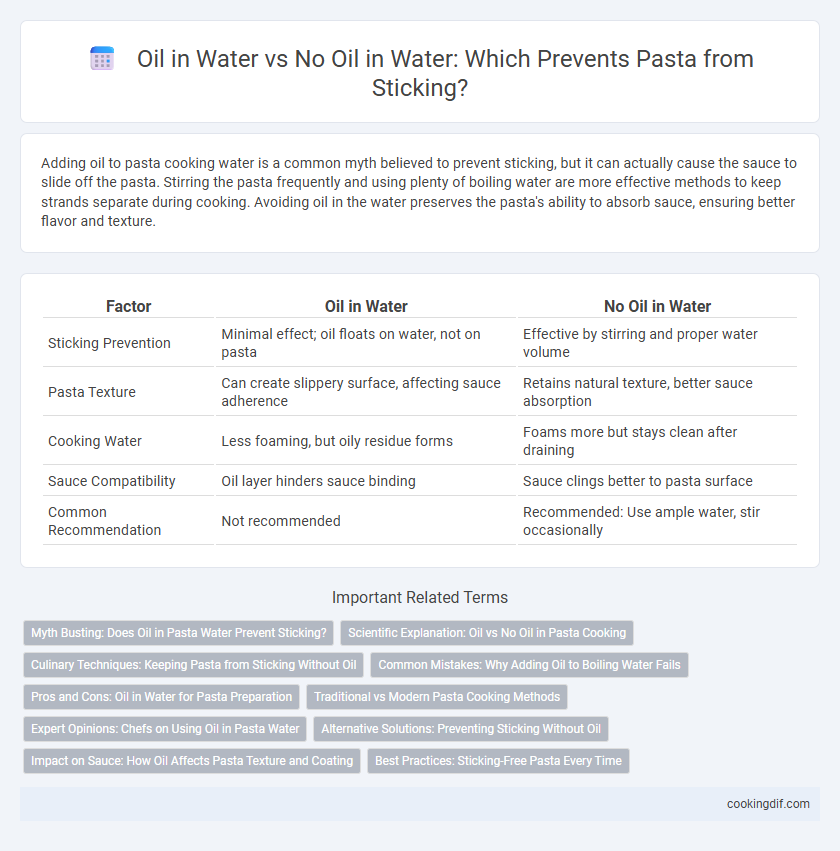Adding oil to pasta cooking water is a common myth believed to prevent sticking, but it can actually cause the sauce to slide off the pasta. Stirring the pasta frequently and using plenty of boiling water are more effective methods to keep strands separate during cooking. Avoiding oil in the water preserves the pasta's ability to absorb sauce, ensuring better flavor and texture.
Table of Comparison
| Factor | Oil in Water | No Oil in Water |
|---|---|---|
| Sticking Prevention | Minimal effect; oil floats on water, not on pasta | Effective by stirring and proper water volume |
| Pasta Texture | Can create slippery surface, affecting sauce adherence | Retains natural texture, better sauce absorption |
| Cooking Water | Less foaming, but oily residue forms | Foams more but stays clean after draining |
| Sauce Compatibility | Oil layer hinders sauce binding | Sauce clings better to pasta surface |
| Common Recommendation | Not recommended | Recommended: Use ample water, stir occasionally |
Myth Busting: Does Oil in Pasta Water Prevent Sticking?
Adding oil to pasta water does not prevent sticking; instead, it creates a slippery surface that hinders sauce adherence. Starch released during cooking is the primary factor causing pasta to stick, which is best managed by stirring and using adequate water. Scientific tests confirm that oil floats on the surface and rarely mixes with water, making its effect on sticking negligible.
Scientific Explanation: Oil vs No Oil in Pasta Cooking
Adding oil to pasta water creates a hydrophobic layer on the surface, which prevents foaming but does not prevent pasta from sticking since pasta releases starch that causes adhesion. Scientific studies show that starch granules swell and leach into the boiling water, forming a viscous, sticky environment between pasta pieces, which oil cannot penetrate to effectively separate. Cooking pasta without oil and stirring frequently allows starch molecules to disperse evenly, minimizing clumping and improving sauce adhesion while maintaining texture and flavor integrity.
Culinary Techniques: Keeping Pasta from Sticking Without Oil
Adding oil to pasta water is a common misconception for preventing sticking, but it can actually hinder sauce adherence by creating a slippery surface on the noodles. Instead, stirring the pasta frequently during the initial cooking phase and using a sufficient amount of boiling water ensures even cooking and reduces clumping. Draining pasta properly and tossing it immediately with sauce or a small amount of reserved pasta water helps maintain texture and prevents sticking without the need for oil.
Common Mistakes: Why Adding Oil to Boiling Water Fails
Adding oil to boiling water is a common mistake because oil floats on the surface and does not mix with water, failing to prevent pasta from sticking. The correct method to avoid sticking is using ample water and stirring pasta during the first few minutes of cooking to separate strands. Over-relying on oil can also cause sauce to slide off cooked pasta, diminishing flavor absorption.
Pros and Cons: Oil in Water for Pasta Preparation
Adding oil to pasta water can prevent noodles from sticking by creating a slippery surface, but it also reduces sauce adhesion, affecting flavor absorption. Without oil, pasta may stick during cooking, requiring frequent stirring, yet sauce clings better, enhancing texture and taste. Chefs often recommend skipping oil to preserve the traditional pasta-sauce interaction despite the risk of sticking.
Traditional vs Modern Pasta Cooking Methods
Traditional pasta cooking methods emphasize boiling pasta in heavily salted water without adding oil, ensuring the sauce adheres better due to the water's starch content. Modern techniques occasionally incorporate a small amount of oil to prevent sticking, but this can create a barrier that reduces sauce absorption and flavor integration. Chefs relying on traditional Italian practices favor stirring frequently and using ample water volume rather than oil to maintain pasta texture and enhance taste.
Expert Opinions: Chefs on Using Oil in Pasta Water
Experts in culinary arts largely agree that adding oil to pasta water is unnecessary and may hinder sauce adherence. Culinary authorities like Chef Alton Brown argue that oil creates a slippery surface on the pasta, preventing sauces from clinging effectively. Instead, chefs recommend using ample salted water and proper stirring techniques to prevent sticking without compromising flavor absorption.
Alternative Solutions: Preventing Sticking Without Oil
Adding oil to pasta water is a common myth for preventing sticking, yet it mainly causes oil to float on the surface and not coat the pasta effectively. Alternative solutions include using a large pot with ample boiling water, stirring pasta frequently during the first minutes of cooking, and ensuring adequate salt in the water to enhance flavor and texture. These methods maintain proper hydration and prevent clumping without the need for oil, preserving the sauce's adhesion to pasta.
Impact on Sauce: How Oil Affects Pasta Texture and Coating
Adding oil to pasta cooking water can prevent sticking but creates a slippery surface that hinders sauce adhesion, resulting in less flavorful dishes. Without oil, pasta retains a slightly rough texture from starch release, allowing sauces to cling better and enhancing overall taste and mouthfeel. For optimal sauce coating, avoiding oil in boiling water is recommended despite the risk of sticking, which can be managed by frequent stirring.
Best Practices: Sticking-Free Pasta Every Time
Adding oil to pasta water is a common myth for preventing sticking, but it actually creates a slippery surface that prevents sauce from adhering properly. The best practice is to use plenty of boiling water, stir pasta frequently during the first few minutes, and drain promptly to avoid clumping. Using ample water and stirring consistently ensures sticking-free pasta while enhancing sauce absorption and flavor.
Oil in water vs No oil in water for sticking prevention Infographic

 cookingdif.com
cookingdif.com